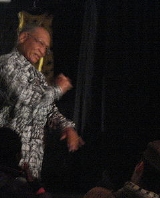
Don Mattera
Encyclopedia

Johannesburg
Johannesburg also known as Jozi, Jo'burg or Egoli, is the largest city in South Africa, by population. Johannesburg is the provincial capital of Gauteng, the wealthiest province in South Africa, having the largest economy of any metropolitan region in Sub-Saharan Africa...
, South Africa
South Africa
The Republic of South Africa is a country in southern Africa. Located at the southern tip of Africa, it is divided into nine provinces, with of coastline on the Atlantic and Indian oceans...
), better known as Don Mattera, is a South Africa
South Africa
The Republic of South Africa is a country in southern Africa. Located at the southern tip of Africa, it is divided into nine provinces, with of coastline on the Atlantic and Indian oceans...
n poet
Poet
A poet is a person who writes poetry. A poet's work can be literal, meaning that his work is derived from a specific event, or metaphorical, meaning that his work can take on many meanings and forms. Poets have existed since antiquity, in nearly all languages, and have produced works that vary...
and author
Author
An author is broadly defined as "the person who originates or gives existence to anything" and that authorship determines responsibility for what is created. Narrowly defined, an author is the originator of any written work.-Legal significance:...
.
Overview
Mattera grew up in Sophiatown, at that time a vibrant centre of South African culture.In his autobiography he writes Sophiatown also had its beauty; picturesque and intimate like most ghettoes. . . . Mansions and quaint cottages . . . stood side by side with rusty wood-and-iron shacks, locked in a fraternal embrace of filth and felony. . . . The rich and the poor, the exploiters and the exploited, all knitted together in a colourful fabric that ignored race or class structures. This "multiracial fabric" did not conform to the separatist policies of apartheid and so the suburb was destroyed and the people forcibly removed.
Don Mattera’s grandfather was an Italian immigrant who married a Xhosa woman from the eastern Cape. They moved to Johannesburg, where Mattera's father was born. At the time, he was classified as an Italian. Under the apartheid system, Don was classified as a "coloured" . This group was the last to be forcibly evicted from Sophiatown; they were taken to the nearby suburbs of Westbury, Newclare and Bosmont. Don is proud of his heritage and considers himself to be Italian.
Mattera was adopted by his grandparents and sent to a Catholic
Catholic
The word catholic comes from the Greek phrase , meaning "on the whole," "according to the whole" or "in general", and is a combination of the Greek words meaning "about" and meaning "whole"...
boarding school
Boarding school
A boarding school is a school where some or all pupils study and live during the school year with their fellow students and possibly teachers and/or administrators. The word 'boarding' is used in the sense of "bed and board," i.e., lodging and meals...
in Durban
Durban
Durban is the largest city in the South African province of KwaZulu-Natal and the third largest city in South Africa. It forms part of the eThekwini metropolitan municipality. Durban is famous for being the busiest port in South Africa. It is also seen as one of the major centres of tourism...
. He returned to Johannesburg when he was 14 and then continued his education in Pageview, another suburb which suffered under apartheid when the residents were again forcibly removed during the 1960’s.
He then became politically active. As a result of these activities, he was banned from 1973 to 1982 and spent three years under house arrest. He was detained, his house was raided, and he was tortured more than once. During this time, he became a founding member of the Black Consciousness movement and joined the ANC Youth League. He helped form the Union of Black Journalists as well as the Congress of South African Writers. He also joined the National Forum, which was against what it referred to as the “racial exclusivity” of the United Democratic Front.
He then worked as a journalist on The Sunday Times, The Sowetan, and The Weekly Mail (now known as the Mail and Guardian).
Don decided to convert to the Muslim
Muslim
A Muslim, also spelled Moslem, is an adherent of Islam, a monotheistic, Abrahamic religion based on the Quran, which Muslims consider the verbatim word of God as revealed to prophet Muhammad. "Muslim" is the Arabic term for "submitter" .Muslims believe that God is one and incomparable...
faith and is now deeply involved in the community, with a special interest in young people and the rehabilitation of ex-prisoners.
Plays
Streetkids, Apartheid in the Court of History, and One Time Brother, which was banned in 1984.Books
- Memory is the Weapon, Ravan Press, 1987, ISBN 0-86-975325-8
- Gone with the Twilight: A Story of Sophiatown, Zed Books (1987), ISBN 0-86-232747-4 (published in the USA as Sophiatown: Coming of Age in South Africa)
- The Storyteller, Justified Press, 1989, ISBN 0-94-745116-1
- The Five Magic Pebbles (illustrated by Erica & Andries Maritz), Skotaville, 1992 ISBN 0-94-747971-6
Poems
- Azanian Love Song, Justified Press 1994 ISBN 0-94-745129-3.
- (Originally published: Skotaville Publishers, 1983 ISBN 0-62-006628-8)
Also written a short story, called Afrika Road
Awards
- PEN Award (1983) for Azanian Love Song
- Noma Children's Book Award (1993) for The Five Magic Pebbles
- Steve Biko Prize for his autobiography, Memory is the Weapon
- Honorary PhD in Literature from the University of Natal, Durban
- The World Health's Organisation's Peace Award from the Centre of Violence and Injury Prevention (1997).
- South African The Order of the Baobab in Gold for "Excellent contribution to literature, achievement in the field of journalism and striving for democracy and justice in South Africa."

